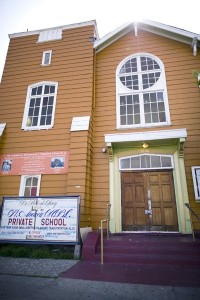St. Andrew’s last BART permit expired in June. But BART’s new rules may not prevent Lacy from obtaining a permit in the future. The school's last permit allowed fundraising from 5 to 8 p.m., and school officials or other adults typically accompanied the students. The school can also dodge the requirements altogether by directing children to panhandle elsewhere.
Linda Haynes, who sent her children to the school eight years ago, said her children were forced to sell candy in order to fund a school field trip. One day, Haynes skipped her job as a house cleaner in San Francisco to secretly stand guard over the kids, who were unsupervised, as they solicited cars from the median on a busy street near the school’s property.
“Three hours they were out there, running back and forth, hollering at cars,” she recalled. “And that area is not a safe area. There’s prostitution down the street. There’s people selling drugs. I had two young ladies going to that school. That’s not a safe place for them to be.”
Haynes said she saw St. Andrew students selling candy at a BART station and outside the Walmart as recently as three weeks ago. She and other parents also have spotted students raising money on Broadway in downtown Oakland. According to BART, some passengers have complained about being approached aggressively.
Concerns about the children first prompted talk of a policy change last September, after BART board member Robert Raburn said he saw several St. Andrew students soliciting funds unsupervised at the Fruitvale BART station. Following stories by California Watch and CBS 5, the BART board asked general counsel Matt Burrows to explore ways to alter the permit policy without trampling on the organization's rights to free speech.
In addition to requiring supervision for children and limiting hours, Burrows told board members that the new rules will require permit holders “to speak from a static location, such as a stationary table, booth or other locations,” to keep them from “walking the station and accosting passengers,” according to a memo dated July 10.
Michael Risher, a staff attorney for the ACLU of Northern California, said the St. Andrew problem might not be large enough to warrant such broad restrictions. The new rules have the potential to infringe on free speech rights, especially if applied liberally, he said, adding that the board should not make the changes “in secret,” but allow the public to have a say.
“What is going to be the geographic scope of these rules?" he said. "If they're only saying, for example in the Embarcadero station, that people can't solicit right in front of the fare gates, that's OK because that can cause a lot of congestion.
"But if they're going to force people off into a place where nobody goes, that's not reasonable. They shouldn't do that," he said. "I’m inclined to say that’s too restrictive."
Raburn called the changes “relatively minor tweaks” and said the new policy, which is still being written, would not come before the board “unless somebody raises their hands and says hold it.”
“For the health and welfare of youth, we have to have some restrictions,” he said. “Adult supervision is absolutely essential.”
But St. Andrew students could still return to BART stations. If they follow the rules, said Allison, the transit agency spokesman, they are eligible for another permit.
“We’re following the U.S. Constitution,” he said. “We’re trying to guarantee people’s First Amendment rights."
Shoshana Walter is the crime reporter for The Bay Citizen
